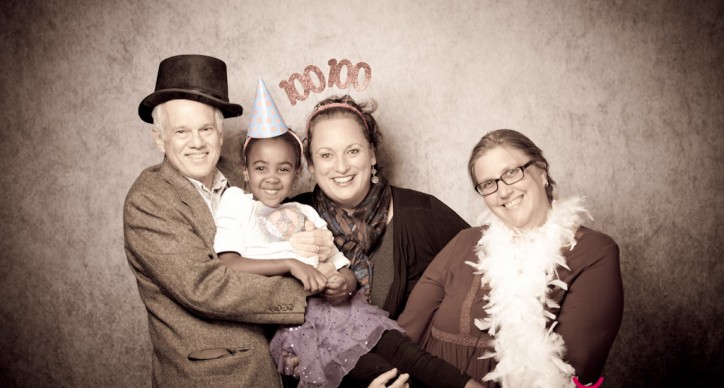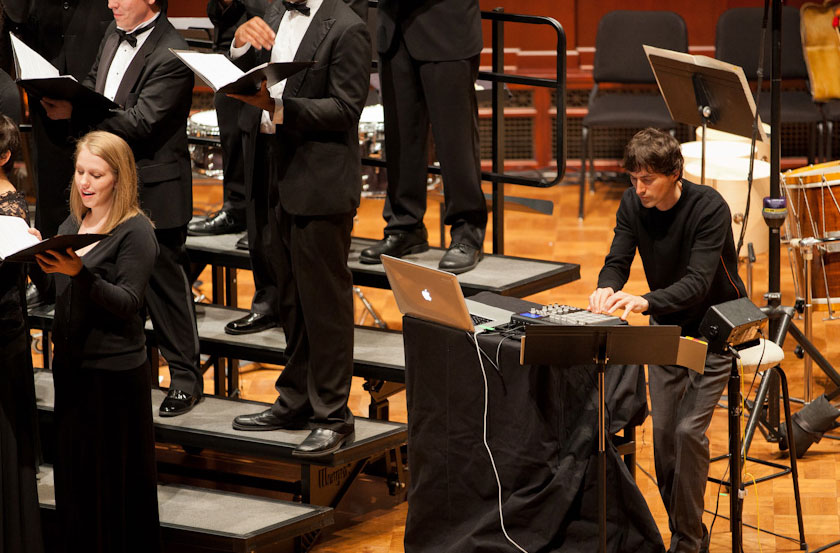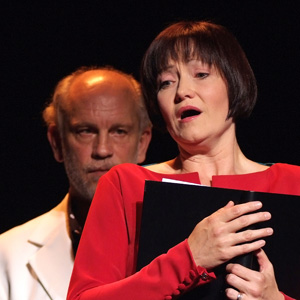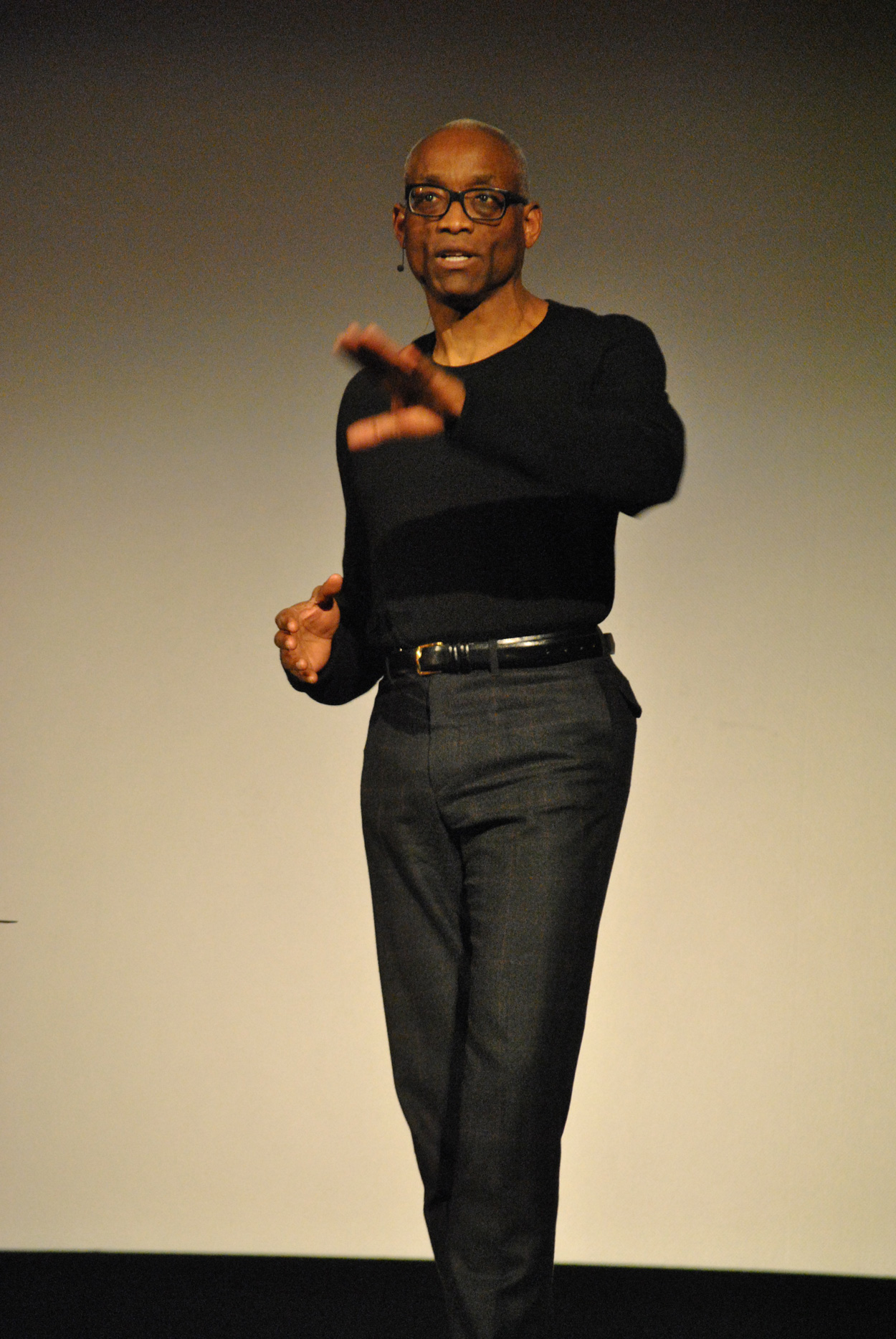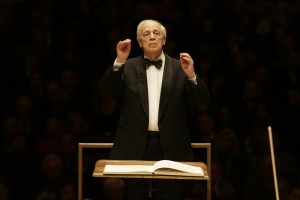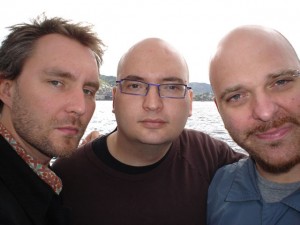Celebrating Hill Auditorium’s 100th Birthday!
UMS is celebrating Hill Auditorium’s 100th birthday this season! Last week, we kicked off our season in Hill Auditorium with the Chicago Symphony Orchestra, which also opened Hill on May 14, 1913.
Our audiences got into the celebratory spirit in our lobby photo booth. Share your own Hill Experiences here.
Photo by Mark Gjukich Photography.
On Mason Bates’ Alternative Energy
Photo: Mason Bates (right) performs Mass Transmission during last year’s San Francisco Symphony American Mavericks festival. His Alternative Energy will be performed by the Chicago Symphony Orchestra on September 27 at Hill Auditorium.
Photo by Mark Gjukich Photography.
Perhaps you’ve heard Mason Bates’ name, perhaps you’ve seen his picture; maybe you know he’s young, widely performed, broadly heralded and highly esteemed.
Neither Mason Bates nor his music reiterates the style or sentiment or personality of the goliaths of American Music who now enjoy the autumn of their careers and whose influence will begin, if not continue, to wane as more and more younger composers begin to assert themselves in American contemporary music. Yes, Mason Bates is part of a sea change because his music demands orchestras to expand their horizons, and because it brings sounds one would never associate with classical music into the concert hall. Alternative Energy is a fantastic example of this fact.
It is well known Mason Bates carries on two musical lives – one as a jet-setting, highly sought-after composer of concert music, and another as a DJ, deep to his elbows in club music and other forms of electronica. Clearly, his creativity sits in between these two musical worlds, because the fingerprint of electronic dance music is almost always perceptible in his more traditional pieces.
Alternative Energy deliberately does not hide its electronic sounds, nor does it shy away from the clarity and kineticism of dubstep and other kinds of dance music. The work compellingly uses the orchestra and electronics to depict the story of American industry’s past, present and future; and, though the piece does not pander, it is undeniably accessible. This is Mason Bates’ secret ingredient: he presents unusual sounds in a welcoming manner.
Video: Violinist Gloria Justen goes toe-to-toe with Mason Bates (DJ Masonic) as he spins for a Mercury Soul event at Mezzanine in San Francisco.
We’ll call this a, “combination of individuality and populism”, and this sentiment lies at the heart of the trend in American composing for which Mason Bates is, already, an elder statesman. All across the country, composers much younger than he are similarly embracing their roots in various types of popular music and incorporating those sounds into their music more boldly, more unapologetically and more ubiquitously than any other generation.
Believe it or not, this kind of eclecticism has typified American music from its beginning – after all, our national anthem borrows a tune from a popular 18th century British drinking song. After decades of esotericism, experimentation and conservatism, maybe American composers are, at last, armed with the experience and gumption to synthesize, from the elements of our culture, a music that clearly reflects and connects their unique identity and the larger world.
Alternative Energy explores and enhances the dynamic range of the orchestra like never before – and if it is any indication for how American music will evolve in the next decade or so, we can all be assured of a diversely influenced and consistently exciting future of heartening concert music, orchestral and otherwise, in this country.
11/12 Choral Union Series
Within the signature Choral Union Series, UMS presents 10 concerts in historic Hill Auditorium:
Subscription packages go on sale to the general public on Monday, May 9, and will be available through Friday, September 17. Current subscribers will receive renewal packets in early May and may renew their series upon receipt of the packet. Tickets to individual events will go on sale to the general public on Monday, August 22 (via www.ums.org) and Wednesday, August 24 (in person and by phone). Not sure if you’re on our mailing list? Click here to update your mailing address to be sure you’ll receive a brochure.
John Malkovich in The Infernal Comedy: Confessions of a Serial Killer
with The Vienna Academy Orchestra
and sopranos Valerie Vinzant and Louise Fribo
Martin Haselböck, conductor
Saturday, October 1, 8pm
John Malkovich makes his UMS debut as a dead serial killer who returns to the stage to present his autobiography in a public reading. Malkovich appears as part of a theatrical opera of sorts that features a 40-piece chamber orchestra and two sopranos telling the real-life story of Jack Unterweger, a convicted murderer and acclaimed prison poet who had been pardoned by the Austrian president Kurt Waldheim in 1990 at the behest of Viennese literati. This gripping performance uses arias and music by Gluck, Vivaldi, Mozart, Beethoven, Boccherini, and Haydn as the counterpoint to Malkovich’s emotional monologue, which shifts between reality and delusion.
Yuja Wang, piano
Sunday, October 9, 4pm
Twenty-four-year-old Chinese pianist Yuja Wang is widely recognized for playing that combines the spontaneity and fearless imagination of youth with the discipline and precision of a mature artist. She made her UMS debut in January 2008, just months after graduating from the Curtis Institute of Music, and since then has spent each year criss-crossing the globe with a cavalcade of impressive debuts and awards, including the prestigious Avery Fisher Career Grant, given to select musicians destined for bright solo careers.
Program
Ravel | Miroirs
Copland | Piano Variations
Rachmaninoff | Selected Preludes
Brahms | Sonata No. 1 or No. 3
Apollo’s Fire with Philippe Jaroussky, countertenor
Jeannette Sorrell, music director
Thursday, November 3, 8pm
UMS is delighted to welcome French countertenor Philippe Jaroussky in his UMS debut for this performance with Apollo’s Fire, “one of the nation’s leading baroque orchestras.” (Boston Globe) Named for the classical god of music and the sun, Apollo’s Fire was founded in 1992 by the young harpsichordist and conductor Jeannette Sorrell, who envisioned an ensemble dedicated to the baroque ideal that music should evoke various passions in its listeners. Together they explore the full dramatic range of Handel and Vivaldi’s arias for the virtuoso castrato singers of the 18th century.
Program
Handel | “Disperato il mar turbato” from Oreste
Handel | “Con l’ali di costanza” from Ariodante
Vivaldi | Concerto for Four Violins in b minor
Vivaldi | “Se in ogni guardo” from Orlando Finto Pazzo
Vivaldi | “Se mai senti spirati sul volto” from Catone in Utica
Vivaldi/Sorrell | La Folia (“Madness”)
Vivaldi | “Vedro con mio diletto” from Giustino
Vivaldi | “Nel profondo” from Orlando Furioso
London Philharmonic Orchestra
Vladimir Jurowski, conductor
Janine Jansen, violin
Tuesday, December 6, 8pm
The London Philharmonic returns for its first appearance since November 2006, this time under the direction of the exciting young conductor Vladimir Jurowski, who became the orchestra’s principal conductor in 2007, succeeding Kurt Masur. Janine Jansen, a 23-year-old violinist who has been a huge star in her native Holland ever since her Concertgebouw debut at the age of 10, makes her UMS debut as violin soloist.
Program
Pintscher | Towards Osiris (2005)
Mozart | Violin Concerto No. 5 in A Major, K. 219 (1775)
Tchaikovsky | Manfred Symphony, Op. 58 (1885)
From the Canyon to the Stars
Hamburg State Symphony
Jeffrey Tate, conductor
Francesco Tristano, piano
Daniel Landau, filmmaker
Sunday, January 29, 4pm
In 1971, Alice Tully, a New York performer and philanthropist who contributed toward the construction of the chamber music hall in Lincoln Center that bears her name, commissioned the French composer Olivier Messiaen to write a piece commemorating America’s Bicentennial. Messiaen was inspired and fascinated by the natural wonder he found in the landscapes of the American West. Des canyons aux étoiles represents Messiaen’s sonic impressions of America’s last untouched frontier.
Program
Messiaen | Des canyons aux étoiles
Chicago Symphony Orchestra
Riccardo Muti, conductor
Pinchas Zukerman, violin
Friday, March 9, 8pm
Riccardo Muti, the Chicago Symphony’s new music director, makes his first UMS appearance in 6 years, conducting an all-Brahms program. Violinist Pinchas Zukerman, recognized as a phenomenon for nearly four decades, returns to UMS for a performance of the Brahms Violin Concerto.
Program
Brahms | Violin Concerto in D Major, Op. 77
Brahms | Symphony No. 2 in D Major, Op. 73
Denis Matsuev, piano
Thursday, March 15, 8pm
Anyone who attended last season’s concert by the Mariinsky Orchestra came away talking about one thing: the astonishing piano soloist Denis Matsuev, whose extraordinary performance of Rachmaninoff’s Third Piano Concerto had the audience buzzing in the lobby at intermission, immediately after the performance, and for weeks beyond the concert hall.
Program
Tchaikovsky | Seasons, Op. 37a
Rachmaninoff | Prelude in g minor, Op. 23, No. 5
Rachmaninoff | Prelude in g-sharp minor, Op. 32, No. 12
Rachmaninoff | Étude-Tableaux, Op. 39, No. 6
Scriabin | Etude in c-sharp minor, Op. 2, No. 1
Scriabin | Etude in d-sharp minor, Op. 8, No. 12
Tchaikovsky | Dumka (Russian Rustic Scene), Op. 59
Stravinsky | Three Movements from Petrouchka
American Mavericks
San Francisco Symphony
Michael Tilson Thomas, conductor
Featuring: Emanuel Ax, piano
St. Lawrence String Quartet
Jessye Norman, soprano, Meredith Monk, vocals, and Joan La Barbara, vocals
Jeremy Denk, piano
Paul Jacobs, organ
Thursday, March 22 – Saturday, March 24
As part of its centennial season, Michael Tilson Thomas and the San Francisco Symphony will present its second American Mavericks Festival in March 2012, which will tour to only two venues in the US: Hill Auditorium and Carnegie Hall. The 2012 festival celebrates the creative pioneering spirit and the composers who created a new American musical voice for the 20th century and beyond. Choral Union Subscribers may choose two of the three concerts on the series.
Program 1 (Thurs 3/22, 7:30p)
Paul Jacobs, organ
Jeremy Denk, piano
Aaron Copland | Orchestral Variations (1930, orchestrated in 1957)
Henry Cowell | Piano Concerto (1928)
Mason Bates | Mass Transmission (2010)
Lou Harrison | Concerto for Organ with Percussion Orchestra
Program 2 (Fri 3/23, 8pm)
Jessye Norman, soprano
Meredith Monk, vocalist
Joan La Barbara, vocalist
St. Lawrence String Quartet
Henry Cowell | Synchrony
John Adams | Absolute Jest (2011)
John Cage | John Cage Songbooks (1970)
Edgard Varese | Amériques
Program 3 (Sat 3/24, 8pm)
Emanuel Ax, piano
Carl Ruggles | Sun-Treader
Morton Feldman | Piano and Orchestra (1975)
Ives | A Concord Symphony
Academy of St. Martin-in-the-Fields
Joshua Bell, director and violinist
Sunday, April 22, 4pm
Formed from a group of leading London musicians and working without a conductor, the Academy gave its first performance in its namesake church in November 1959. For their first UMS appearance in 11 years, the Academy brings their highly lauded sound to an exquisite all-Beethoven program. Superstar violinist Joshua Bell attacks the stunning Beethoven Concerto with his breathtaking virtuosity and sumptuous tone and leads the rest of the program from the concertmaster’s chair.
Program
Beethoven | Coriolan Overture, Op. 62
Beethoven | Concerto for Violin in D Major, Op. 62
Beethoven | Symphony No. 7 in A Major, Op. 92
Return to the complete chronological list.
Links: UMS in the News
Since the beginning of January, we’ve had a busy and exciting 8 weeks of 12 performances in all the big genres: dance, jazz, world music, classical music, and theater. It’s definitely a whirlwind experience for all of us on staff to see and talk about so many events – and there’s definitely been plenty to talk about! In case you missed it, here’s a roundup of UMS in the news:
- Chris Azzopardi of Between the Lines interviewed Bill T. Jones about his motivations for creating Fondly Do We Hope…Fervently Do We Pray and what’s next for his company.
- James Leonard of the Ann Arbor Observer speculated about UMS’s 10/11 season and which orchestra would join the UMS Choral Union in Mahler’s Symphony No. 8 “Symphony of a Thousand” (it’s the DSO, in case you haven’t heard yet!).
- UMS was awarded a share of a $1.9 million dollar grant from the Mellon Foundation to support classical music programming, along with Cal Performances at the University of California-Berkeley and the Krannert Center for the Performing Arts at the University of Illinois in Urbana-Champaign.
- Two of UMS’s very own staff members boldly journeyed into the blogosphere as guest bloggers. UMS Director of Programming Michael Kondziolka blogged at ArtsJournal.com on how artistic programs are chosen and what makes an artist special. UMS Director of Marketing and Communications Sara Billmann blogged for the American Orchestras Summit on the future of orchestral music.
- Susan Nisbett of AnnArbor.com reviewed Fondly Do We Hope…Fervently Do We Pray which created some conversation in the comments section.
- Mark Stryker of the Detroit Free Press interviewed legendary conductor Pierre Boulez on the occasion of his 85th birthday, and in conjunction with the Chicago Symphony Orchestra’s Ann Arbor performance.
- Have you heard of Concentrate? Managing Editor Jeff Myers has been writing fun, quirky, and media-rich profiles of UMS events for a while — and they’re really fantastic. If you’re having a hard time convincing your friend to go to a performance with you, Concentrate is just what the doctor ordered. Check out past profiles on Ladysmith Black Mambazo, The Bad Plus, and the Luciana Souza Trio.
- UMS’s exclusive backstage video with jazz trio The Bad Plus was featured on AnnArbor.com. Don’t miss the honey bear (that’s all I’m gonna say).
- Other AnnArbor.com reviews included Bela Fleck: The Africa Project, the Swedish Radio Choir, and the Schubert Piano Trios (with David Finckel, Wu Han, and Philip Setzer).
The Chicago Symphony Orchestra: A Personal Reflection by Michael Kondziolka, UMS Director of Programming
I had such a formative concert experience as a 22-year-old with a performance by the Chicago Symphony that every time they come back to UMS, I relive it…and get really excited and end up feeling like an (overly) passionate young adult again!!

Sir Georg Solti
The concert was in Minneapolis’ Orchestra Hall. Sir Georg Solti was conducting. It opened with the “Prelude and Liebestod” from Tristan and was followed by a performance of John Corigliano’s Clarinet Concerto which, in the last movement, features large choirs of brass, performed from the back of the house. It was so powerful and overwhelming (Chicago BRASS!!) that the next thing I knew, I was leading a standing ovation from the center of the main floor. My friends thought I had lost my mind. (Ah, youth!!)
This Wednesday’s CSO concert in Hill Auditorium is stacking up to be a repeat, I think. For many reasons…not the least of which is the antiphonal brass moments planned from the back of Hill Auditorium in the Bartók Bluebeard’s Castle. The score also calls for the BIG Hill organ.
Extraordinary and impactful repertoire (a 20th-century masterpiece, really)…one of the world’s great orchestras…and a conductor who is completely committed to inspiring the orchestra to greatness: PIERRE BOULEZ!! A veritable legend of 20th-century music in his own right.
A master with a masterpiece…my favorite combination.
Last week, I started hearing from some friends and colleagues who had witnessed the concerts in Chicago given earlier this month. They confirmed that they were really OVER-THE-TOP, -once-in-a-lifetime experiences. I went home that night and started snooping around on YouTube to find my favorite clips from Bluebeard…I wanted to crank the fifth door section loudly on my stereo. As I was “grooving” on C Major – there is nothing like it – I looked down and saw the most recent listener comment…and immediately sent it to the entire UMS staff. It only fueled my enthusiasm and reinforced what I was already suspecting and hearing:
“Just saw the Chicago Symphony Orchestra do this tonight! So @#$%#$ powerful! [expletive deleted] Not only are there 4 trumpets, four trombones, a tuba and organ, but 4 more trumpets and 4 trombones off stage…plus Judith screaming over the top! I was as close to a heaven as I am ever going to get.”
I hope you can be there this Wednesday.
Michael Kondziolka
UMS Director of Programming


